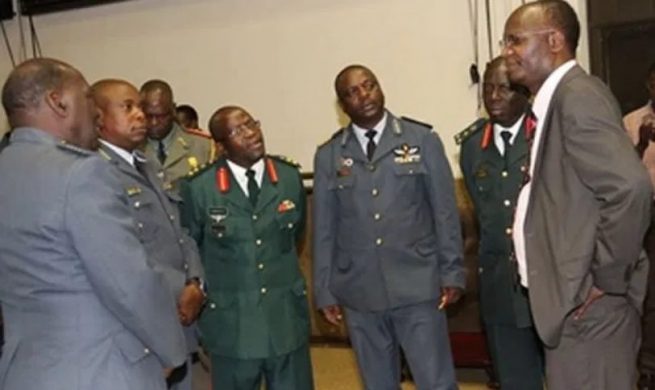Moyo tells military to return to barracks, leave politics

Jonathan Moyo, a Zimbabwean professor of politics, says calls by some local analysts for the military – which has become a power broker – to be involved in talks to resolve the country’s deepening crisis are politically, democratically and practically undesirable and untenable.
“Has Zimbabwe suddenly become a Myanmar? The argument is tantamount to an endorsement of the military state and to giving the military a veto power. The military must get out of politics and return to the barracks, unconditionally. This principle is non-negotiable!,” Moyo said.
Prof Moyo was responding to a paper titled Crisis, Dialogue and Transition in Zimbabwe: Quo Vadis Zim? published on Thursday this week, Zimbabwe’s military, which played a crucial role in the ouster of long-time ruler Robert Mugabe in 2017, has a role in forging an internal settlement.
The paper argues that at the heart of the Zimbabwean crisis lies an emerging nationalistic military business and political class that has been attempting to grow its tentacles in all sectors of society.
“Most of the dialogue processes that have happened in Zimbabwe have missed ‘the military factor’ in resolving the political and economic impasse, leading to repeating bouts of botched transitions,” the paper says.
“To resolve Zimbabwe’s transition challenges, the paper proposes two solutions: Civil society to initiate and implement a process of citizens’ dialogue series on how to resolve the identified three spheres and sub-spheres of conflict, but using the 2013 Constitution as the point of departure. There is the need to initiate a political process that engages the emerging military business-politico elite to come up with a political settlement with the objective of demilitarising public affairs.
“SADC provides the most viable option to address this militarisation of Zimbabwe’s body politic. Whilst there are suggestions on the possibility of engaging the United Nations to resolve the transition challenges in Zimbabwe, this is most like likely to falter due to the politics of the UN Security Council.”
Before Mugabe’s fall from grace, the army played a role in ensuring his iron-clad grip on power, despite several calls for security sector reform by the opposition.
Attempts by the ruling party to push for national talks via the Political Actors’ Dialogue platform are considered futile by the main opposition MDC Alliance, the party that came second to ZANU-PF in the disputed 31 July 2018 general elections.
“The positions from Zimbabwe’s major political parties indicate the two diametrically opposed views on the causes of the crisis, creating a complex situation in reconciling these two sides that have been warring for the past two decades,” the paper further reads.
“Therefore, it can be argued that to resolve the Zimbabwe crisis, one has to contend with its multiple causal factors that have informed and shaped the various processes of the history of transitional politics within the country.”
– NewsHawks






